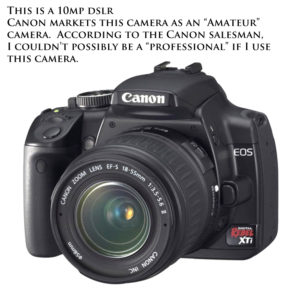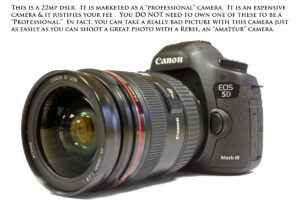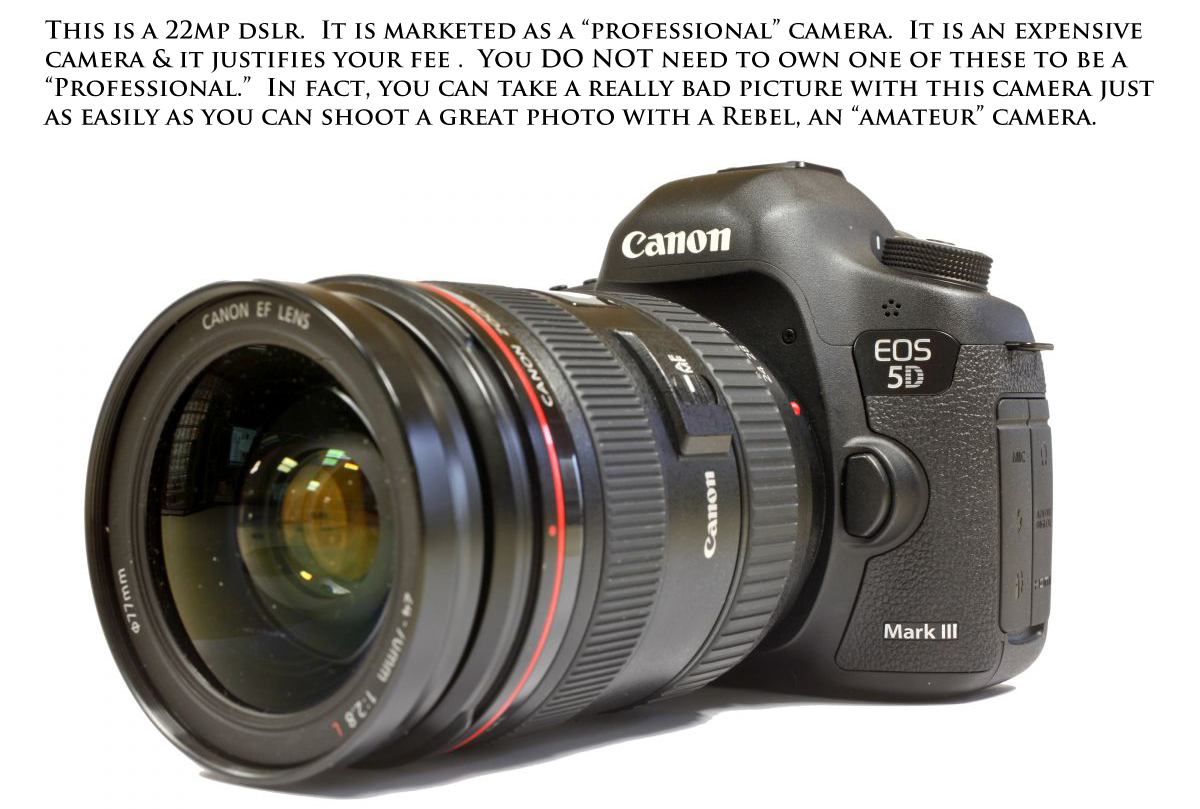AN EXPENSIVE CAMERA FOR YOUR EGO GRATIFICATION
Guest Blog by Photographer Dale O’Dell
You can view Dale’s creative photography on his website
 “It’s a 400-D.” I answered.
“It’s a 400-D.” I answered.
“A 400-D is a Rebel XTi, that’s an amateur camera, you’re not a professional!” and that abruptly ended the conversation with the rep at the Canon booth as he walked away and wouldn’t talk to me anymore.
“What the hell was that?” my wife asked.
“That’s what I’ve been saying. These guys don’t judge a photographer by his photographs they judge photographers by what kind of cameras they use.” I (again) explained. “It’s like I’ve been telling you; he doesn’t know who I am, he’s never seen one of my pictures, and the work, the actual photographs, doesn’t matter to him or all the other people like him. In their view you can’t possibly take a professional photograph with an amateur camera.”
“That’s ridiculous.” She replied.
“Yes it is,” I agreed, “it’s all consumerist marketing crap but that’s how these guys judge you.”
“I guess you need a new camera.”
“No, not really, but they need me to use a camera they think takes better pictures; I have to deal with their screwed-up psychology. And it serves to justify my day-rate.”
And that’s why I upgraded my DSLR.
Not because I really need 22 megapixels, but my clients think they do —and these are the same people that insisted, back in the film days, I shoot with a 4×5 view camera for a postage-stamp reproduction size. They know nothing! Yet I’m compelled to kowtow to their stupid, equipment-based idea of what ‘professional’ is.
And how does one determine if someone is a ‘professional?’ By the kind of camera you use and by the size of your studio. And this is wrong. It is ego and marketing-based bull that shallow, low-information people use to judge others.
The dictionary definition of the word professional says: …engaged in a specific activity as a source of livelihood. Notice the word ‘livelihood’ and not ‘income.’ You are a ‘professional photographer’ if your source of livelihood, not just a few extra bucks, comes from the production of photographs.
The dictionary definition does not mention anything about the kind of tools (camera) you use. So in other words, if you earn your entire income from making pictures with a home-made pinhole camera, you are a professional, despite what the sales guys in the Canon booth thinks.
I believe there is a second component that defines what a ‘professional’ is, and that is acting professionally. If you don’t have a clue what you’re doing, you’re late, miss deadlines or do dumb stuff you’re just not professional. ‘Professional’ is a combination of livelihood-earning and attitude.
Let’s carry this to an absurd level just to help the stupid people understand. If you act with confidence and competence and earn your living from the production of photographs then you are a professional photographer —your camera equipment is irrelevant. If you’re a pseudo photographer who takes pictures with a six-thousand dollar camera with the word ‘professional’ embossed on it that you purchased with the paycheck from your job in the cubicle you are not a professional, you are instead a pseudo photographer takes pictures with a six-thousand dollar camera with the word ‘professional’ embossed on it.
Do you understand the difference?
Photographers are judged by their cameras because it’s easy.

It’s because of our consumerist society. People know prices, they know famous names and they know ‘labels.’ And they have expectations. They expect a professional photographer to a more expensive, name-brand camera that’s bigger than theirs. They figure if you’re using the same camera they’ve got, then they can take just as good a picture as you can, after all, they’ve got the same equipment, so why not? Of course this is stupid and shallow thinking and does not take into consideration things like photography school, or experience or even talent.
But nowadays everybody’s a photographer, so everyone’s a photography ‘expert.’ Few other professions are like this. Most everyone uses the same word-processing programs, Word or WordPerfect, but no one assumes them to be Stephen King or J.K. Rowling. A lot of people own guitars but that makes them neither a rock star nor musician. Suzuki sells a lot of GSXR1000s but no one riding one with a license plate mistakes themselves for Gran Prix champion.
Continuing the motorcycle metaphor, I can tell you from experience that it’s a lot more fun to ride a slow bike fast than to ride a fast bike slow. Similarly, making a great photo with a less than great camera is more fulfilling than making mediocre photos with a ‘professional’ camera.
It’s not about cameras or any kind of equipment, you know this. I’ve never seen any photographs (if there are any) made by the guy in the Canon booth but I can infer that he’s using top of the line Canon cameras because he works for Canon. Since he works for Canon he’s not a professional photographer but rather, a camera sales rep who takes pictures with a ‘professional’ camera. I won’t judge him by his camera (the way he judged me) but based on his attitude I feel confident that I can make better photos than him with my eyes tied behind my back all the while using a shitty ‘amateur’ 10 megapixel camera!
A thoughtful person would only find it logical to judge a photographer by his photographs. They understand that anyone can buy a certain kind of camera… anybody! And they also understand that only you make your photographs, so it only makes sense to judge a photographer by his resultant photographs and not the camera.
But most folks are not thoughtful so they’ll judge you by your camera. So that’s why I bought a ‘professional’ camera. I bought it for them. And it’s a very nice camera, but I’m still the same photographer who shot the same great photos with an ‘amateur’ camera. So what’s the difference?
Now they like my photos and they like my camera too.
Guest Blog by Photographer Dale O’Dell
You can view Dale’s creative photography on his website
Jody Miller is a professional photographer specializing in Horse Photography, Equine Photography, and Equestrian photography. Her work can be viewed online here in her gallery section, and she is also featured at these Arizona Galleries: Arts Prescott Gallery, Sedona’s Village Gallery , Easy Street Galleria in Carefree and Dragonfly Arts in Cottonwood.
